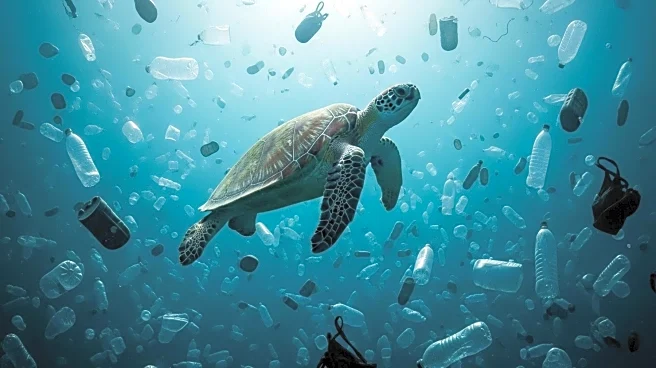What's Happening?
A recent analysis highlights that five countries are responsible for the majority of plastic waste that ends up in the world's oceans, with seven of the top ten contributors located in Asia. China, the Philippines, and India are the leading contributors, with China alone accounting for over 2.6 million tonnes of plastic waste from 2010 to 2019. This waste often travels across oceans, affecting marine life and coastal communities worldwide. The data, sourced from the Global Plastic Hub, underscores the significant role of rapid economic growth, urbanization, and inadequate waste management systems in these countries, contributing to the high levels of plastic leakage into the oceans.
Why It's Important?
The issue of ocean plastic waste is a critical environmental challenge with far-reaching implications. The accumulation of plastic in marine environments poses severe threats to marine biodiversity, disrupts ecosystems, and impacts human communities reliant on these ecosystems for their livelihoods. Economically, the cost of marine plastic pollution is estimated to range from $6 to $19 billion annually, affecting industries such as fishing, tourism, and shipping. The data emphasizes the need for improved waste management systems and international cooperation to address the root causes of plastic pollution and mitigate its impact on global marine environments.
What's Next?
Efforts to combat ocean plastic pollution are likely to focus on enhancing waste management infrastructure in the most affected countries, particularly in Asia. International collaborations and policy initiatives may be necessary to support these efforts, alongside technological innovations aimed at reducing plastic production and improving recycling processes. Stakeholders, including governments, environmental organizations, and the private sector, are expected to play crucial roles in driving these changes. The economic and environmental stakes underscore the urgency of implementing effective solutions to curb plastic waste leakage into the oceans.
Beyond the Headlines
The pervasive issue of plastic waste in oceans also raises ethical and cultural questions about consumption patterns and environmental responsibility. As awareness grows, there may be a shift towards more sustainable practices and products, influencing consumer behavior and corporate strategies. Additionally, the legal frameworks governing waste management and environmental protection may evolve to impose stricter regulations and penalties for non-compliance, further shaping the global response to this pressing environmental challenge.









